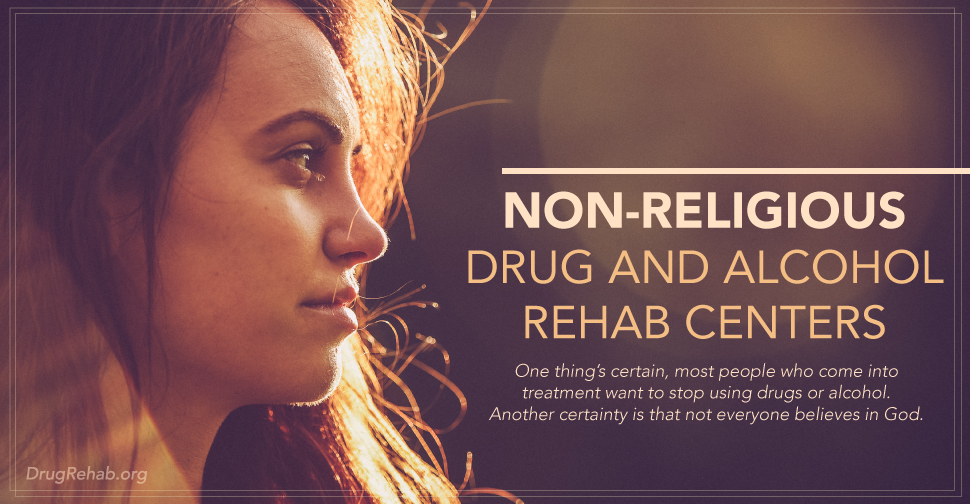
Everyone’s experience with substance abuse is different and therefore not all reasons for recovery are exactly the same either. One thing’s certain, most people who come into treatment want to stop using drugs or alcohol. Another certainty is that not everyone believes in God. A non-religious rehab center can give you the full treatment without feeling the need to change some of your beliefs.
“God, grant me the serenity to accept the things I can not change…” This simple opening statement might scare people away from support groups or put a bad taste in their mouth about recovery programs. Not everyone goes into rehab or recovery with the intention to find God or a “higher power.” A lot of people go into recovery with serious health complications, scared, and maybe even on the verge of death. Most of them have one common purpose—to stop using drugs or alcohol.
What Does It Mean To Be Addicted To Drugs Or Alcohol?
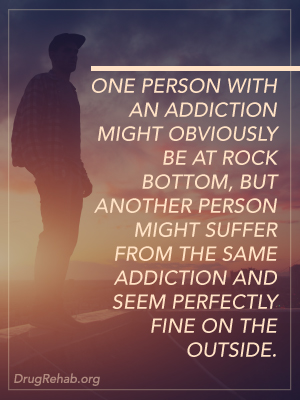 Being addicted to drugs or alcohol can have different meanings from one person to the next. One person with an addiction might obviously be at rock bottom, but another person might suffer from the same addiction and seem perfectly fine on the outside. At the beginning of most addictions is a substance use disorder, wherein a person continues using a drug even after bad things start to happen in their life.
Being addicted to drugs or alcohol can have different meanings from one person to the next. One person with an addiction might obviously be at rock bottom, but another person might suffer from the same addiction and seem perfectly fine on the outside. At the beginning of most addictions is a substance use disorder, wherein a person continues using a drug even after bad things start to happen in their life.
Whether a person has a problem with heroin, alcohol, cocaine, crystal meth, crack, marijuana, nicotine, prescription drugs, steroids, food, sex, inhalants or anything else that causes euphoria. Addiction is best understood as a disease, and some of the further implications are:
- The substance is often taken in larger amounts or over a longer period than was intended.
- There is a persistent desire or unsuccessful effort to cut down or control use of the substance.
- A great deal of time is spent in activities necessary to obtain the substance, use the substance, or recover from its effects.
- Craving, or a strong desire or urge to use the substance.
- Recurrent use of the substance resulting in a failure to fulfill major role obligations at work, school, or home.
- Continued use of the substance despite having persistent or recurrent social or interpersonal problems caused or exacerbated by the effects of its use.
- Important social, occupational, or recreational activities are given up or reduced because of use of the substance.
- Recurrent use of the substance in situations in which it is physically hazardous.
- Use of the substance is continued despite knowledge of having a persistent or recurrent physical or psychological problem that is likely to have been caused or exacerbated by the substance.
- Tolerance, as defined by either of the following:
- A need for markedly increased amounts of the substance to achieve intoxication or desired effect.
- A markedly diminished effect with continued use of the same amount of the substance.
- Withdrawal, as manifested by either of the following:
-
- The characteristic withdrawal syndrome for that substance (as specified in the DSM- 5 for each substance).
- The substance (or a closely related substance) is taken to relieve or avoid withdrawal symptoms.
(National Institute on Drug Abuse – NIDA)
What Are Some Of The Most Common Withdrawal Symptoms?
Whether a person intends to stop using drugs for good or just stops using them for a couple days, they’re likely going to experience some withdrawals. Withdrawals are a natural physical and mental reaction to lack of a substance. It can be pretty common for a person to lash out at their loved ones or relapse in reaction of withdrawal symptoms. Across the board of substance abuse and addiction, the most common withdrawal symptoms can include:
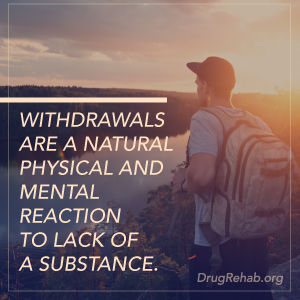
- Irritability
- Inability to Concentrate
- Insomnia
- Anxiety and Panic Attacks
- Muscle Pain
- Irregular Heartbeat
- Nausea
- Frequent Headaches
- Hypertension
These symptoms are usually pretty uncomfortable to deal with and a medically supervised detoxification can make them go by a little faster. Detoxification is essentially getting unwanted chemicals out of the system, and it’s usually during this time that a person must fight against the withdrawal symptoms as well.
Is Detoxification Different In A Non-Religious Setting?
“Physical dependence…may occur with the regular (daily or almost daily) use of any substance, legal or illegal, even when taken as prescribed” (NIDA). Whether you’re Christian, Buddhist, Muslim, Jewish, Atheist or Agnostic, the effect that drugs and alcohol have on your body doesn’t change. So when a person with a substance use disorder or drug dependence stops using their drug of choice, their body pushes the drug out of the system; this process is known as detoxification.
A professional medical detoxification is necessary for individuals struggling with alcohol abuse, benzodiazepines or opiates. A residential detoxification will give someone a chance to get much needed rest, nutrients and fluids required to be healthy, and most importantly a chance to stay in a place free of stressors—and other triggers of drug and alcohol use. Detoxification alone is not a full addiction treatment; it’s only the beginning, and must therefore be paired with other treatment modalities in order to be successful.
Secular Addiction Treatment Programs
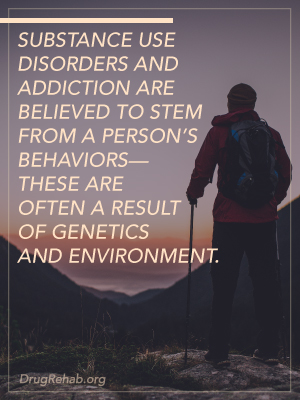 A spiritual program can be pretty uncomfortable for a person who doesn’t believe in God, and even for a person with a strong religious background, some of the ideals and opinions shared in groups like Alcoholics Anonymous can make recovery difficult. Substance use disorders and addiction are believed to stem from a person’s behaviors—these are often a result of genetics and environment. A person who doesn’t believe or doesn’t want to believe in a “higher power” might not be able to move forward in certain 12 step support groups.
A spiritual program can be pretty uncomfortable for a person who doesn’t believe in God, and even for a person with a strong religious background, some of the ideals and opinions shared in groups like Alcoholics Anonymous can make recovery difficult. Substance use disorders and addiction are believed to stem from a person’s behaviors—these are often a result of genetics and environment. A person who doesn’t believe or doesn’t want to believe in a “higher power” might not be able to move forward in certain 12 step support groups.
Even though 12 step groups involve a fair amount of prayer, they claim to be spiritual and not religious, which can also confusing and hard to grasp for a non-religious person. There are a lot of different evidence-based therapies which can help a non-religious person feel a bit more comfortable with treatment, but in order to be successful they must fully live the program—whichever that may be.
What Are A Few Of The Different Behavioral Treatment Modalities?
We’re all different, and not everyone suffers from an addiction to the same drug. Consequently, there are a lot different ways to treat addiction. Some of the different non-religious treatment modalities can be:
- Evaluation
- Family and Peer Support
- Individual and Group Therapy
- Dialectical Behavior Therapy
- Cognitive Behavioral Therapy
- Contingency-Management
- Agnostic Support Group
- Other Non 12-Step Support Groups
- Relapse Prevention
- Aftercare Support
Evidence-Based Addiction Treatment
In this day and age, drug addiction treatment focuses on more than spiritual sickness and social and moral failings. So what does that mean? “Each approach to drug treatment is designed to address certain aspects of drug addiction and its consequences for the individual, family, and society” (NIDA). Two of the main methods of evidence based treatment are pharmacological and behavioral therapies.

Pharmacological therapy is also known as medication-assisted therapy, and can be found in some opioid addiction treatment programs. Medication can be used to help a person deal with painful withdrawal symptoms, but like detoxification, it isn’t a cure all for addiction. Usually medication-assisted therapy implies that there is a behavioral therapy which is aided by a medication—but in some cases, patients will need to continue taking a partial opioid like Suboxone for a year or longer to avoid relapse.
Addiction Treatment Using Dialectical Behavior Therapy
Dialectical behavior therapy can help a person recognize their behavior as being unhealthy while teaching them mindfulness, emotion regulation, interpersonal effectiveness, and distress tolerance. It can also give them an opportunity to talk about and correct those behaviors. A lot of people suffering from an addiction can’t see that what they’re doing is harmful, but that can be possible with the help of a trained behavioral therapist.
Usually in an evaluation session (but also whenever problems pop up) therapists categorize those behaviors and treat the patient based on the amount of danger they’re likely to be in. These behaviors are generally treated in this order:
- Life-threatening behaviors: First and foremost, behaviors that could lead to the client’s death are targeted, including all forms of suicidal and nonsuicidal self-injury, suicidal ideation, suicide communications, and other behaviors engaged in for the purpose of causing bodily harm.
- Therapy-interfering behaviors: This includes any behavior that interferes with the client receiving effective treatment. These behaviors can be on the part of the client and/or the therapist, such as coming late to sessions, cancelling appointments, and being non-collaborative in working towards treatment goals.
- Quality of life behaviors: This category includes any other type of behavior that interferes with clients having a reasonable quality of life, such as mental disorders, relationship problems, and financial or housing crises.
- Skills acquisition: This refers to the need for clients to learn new skillful behaviors to replace ineffective behaviors and help them achieve their goals.
(The Linehan Institute)
Addiction Treatment Using Cognitive Behavioral Therapy
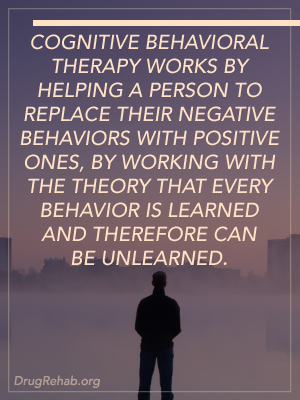 Cognitive behavioral therapy also helps a person practice healthy behaviors. The main focus of this modality is to prevent a person from relapsing, and because relapse is always a possibility, a person in recovery must always be aware of their feelings and surroundings. Cognitive behavioral therapy works by helping a person to replace their negative behaviors with positive ones, by working with the theory that every behavior is learned and therefore can be unlearned.
Cognitive behavioral therapy also helps a person practice healthy behaviors. The main focus of this modality is to prevent a person from relapsing, and because relapse is always a possibility, a person in recovery must always be aware of their feelings and surroundings. Cognitive behavioral therapy works by helping a person to replace their negative behaviors with positive ones, by working with the theory that every behavior is learned and therefore can be unlearned.
Here’s an example from the U.S. National Library of Medicine of how cognitive behavioral therapy works, “in anxiety disorders, behavioral therapy often includes learning methods to help you calm down. For example, you can learn to reduce anxiety by consciously breathing in and out deeply so that your body and breathing can relax. When doing this you concentrate on your breathing instead of what is bringing on your anxiety.” Similarly with addiction, a person is taught to recognize when they have an urge to drink or drug; and then replace those thoughts with healthier and less harmful ones.
Addiction Treatment Using Contingency Management
Contingency management is a form of positive reinforcement where a person who’s suffering from an addiction or substance use disorder is rewarded for sober time. This type of treatment program is widely used in probation and parole settings, but can also work for people in outpatient treatment settings who are still likely to have access to drugs on a day to day basis. Contingency management can also be used for inpatient treatment settings.
“Studies conducted in both methadone programs and psychosocial counseling treatment programs demonstrate that incentive-based interventions are highly effective in increasing treatment retention and promoting abstinence from drugs” (National Institute on Drug Abuse).
These motivational incentives can include voucher rewards and prize incentives for clean drug and alcohol tests. Voucher rewards are most commonly good for movie passes, food items, and other goods. Prize incentives are usually cash value and other redeemable rewards. The point is to help a person with an addiction realize that if they have a good enough reason, along with the right kind of therapy and support they won’t need to use drugs or alcohol.
Non-Religious Inpatient And Outpatient Rehab
There are even more treatment programs that we can help you explore and understand. Each of the methods to recovery takes place in one of two settings; inpatient residential treatment or outpatient treatment. These programs can take place in a variety of settings, and might have a main focus on mindfulness with an outdoor therapy, or perhaps focusing on the the way a brain works with a scientific approach to treatment.
Some people just need to get away from stress that they can’t seem to cope with in a healthy way; for them there is a luxury rehab facility. It all depends on which walk of life you come from, and we can help you get there, as long as you truly want to stop using drugs or alcohol. With a non-religious rehab, whether you’re religious or not, the focus is on your sobriety and not God. So no matter who you are, there’s a treatment program that’s right for you.
Kudos to the people who have found their saving grace through a spiritual support group. Our efforts are not to marginalize your beliefs or your causes—the point is to reach out to those who might not find recovery or support any other way.
How To Find A Non-Religious Treatment Center
Contact Drugrehab.org today if you or someone you know is struggling with drugs or alcohol and is interested in attending an non-religious drug and alcohol rehab center. Our treatment specialists will help you find the program that best suits your needs.
For More Information Related to “Non-Religious Drug and Alcohol Rehab Centers” Be Sure To Check Out These Additional Resources From DrugRehab.org:
- The Benefits of Faith-Based Recovery Programs
- Christian Vs Secular Addiction Counseling
- Luxury Drug Rehab | Private Treatment Centers
- What Is Client-Centered Therapy For Addiction Treatment
- Alternative Drug Rehab And Non Traditional Rehabilitation Methods
- Methadone vs. Suboxone: Pros And Cons Of Both
- Is Detox Always Required Before Entering A Drug Rehab
Sources
National Institute on Drug Abuse – Contingency Management Interventions/Motivational Incentives (Alcohol, Stimulants, Opioids, Marijuana, Nicotine)
National Institute on Drug Abuse – Evidence-Based Approaches to Drug Addiction Treatment
National Institute on Drug Abuse – The Science of Drug Abuse and Addiction: The Basics
The Linehan Institute – What Is DBT?
U.S. National Library of Medicine – Cognitive Behavioral Therapy

